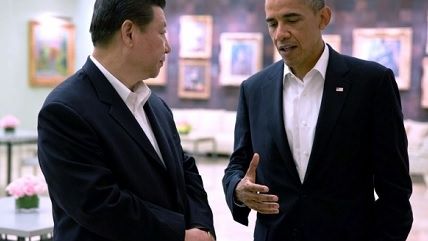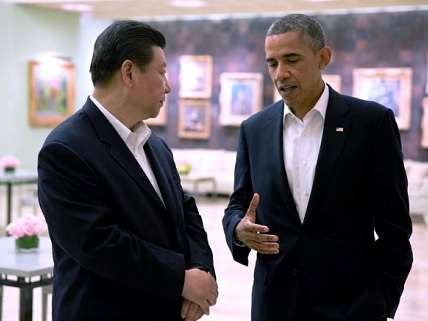Obama Administration Still Figuring Out China Policy with Less Than 16 Months Left in Office
Were confused why taking a more confrontational stance led to China doing the same.


The president of China, Xi Jinping, arrived in the United States yesterday for an official state visit—it will be his third meeting with President Obama since taking office in 2013, but the Obama administration, as The New York Times reports, is still struggling to articulate a clear China policy:
This week's meeting between President Obama and Mr. Xi is fraught with points of conflict, and its unspoken subtext is whether the president will confront the Chinese directly, deliberately causing friction in the relationship in hopes of drawing some lines around their behavior, or celebrate an unexpected partnership on issues like climate change and Iran, handling contentious issues in private.
The administration has tried both approaches, and has often come away frustrated and dissatisfied, according to senior officials, some of whom have left the government recently and spoke on the condition of anonymity. But Mr. Obama recognizes that what amounts to his third long meeting with Mr. Xi, a formal state visit full of ceremonial displays of respect and cooperation that begins here Thursday, is likely to be his last chance to start what one White House official calls "long-ball diplomacy with the Chinese.
As The Times explains, the Obama administration was caught by surprise because it did not expect Xi to be as confrontational as he has been. Many members of the administration expected him to be, in the words of The Times, "a dynamic reformer who would press for broader engagement with the United States while bringing the military under his control." Instead, the administration got Xi the "risk-taker."
The most prominent of the confrontations was in the South China Sea, where the Chinese government has asserted claims of sovereignty over disputed territory. Last week, the senior Pentagon official for Asia and the Pacific admitted, in a line of questioning by Sen. John McCain (R-Ariz.), that the U.S. had not sent any ships or aircraft to within 12 nautical miles, the internationally recognized zone of sovereignty that extends from land, of China's claims in the South China Sea. McCain and other hawks would like to see the U.S. challenge Chinese claims more directly. The U.S., of course, does not make any disputed claims of sovereignty over any territory in the South China Sea, but Brunei, Malaysia, the Philippines, Taiwan, and Vietnam do. The U.S. considers a number of those countries, most notably Taiwan and the Philippines, allies. Neither has the military capability to challenge China on their own, in part because of the long history of military commitments the U.S. has been more than willing to make in regards to those country's security.
President Obama announced an "Asia pivot" in a visit to Australia in 2011. That wasn't so much a comprehensive strategy as it was a commitment to spend more money, sending more military, commercial, and diplomatic resources to various U.S. allies surrounding China. The Chinese government, unsurprisingly, is not impressed. It's important to note this "pivot," which was clearly about containing China, was first announced more than a year before Xi took office. And yet the Obama administration, apparently, expected Xi not to adjust China's U.S. policy in response to a U.S. China policy shifting toward the more confrontational. These are the people in charge of foreign policy.
It gets worse. Republican presidential candidates haven't challenged America's China policy as being too needlessly confrontational, but not enough. Recent presidential drop-out Scott Walker wanted the U.S. to cancel Xi's state visit. Frontrunner Donald Trump constantly complains about China. And Bernie Sanders, the insurgent Democratic presidential candidate whose positions are increasingly influencing other Democratic candidates, also complains about China and its effects on the American worker.
On Xi's current trip to the U.S., the Obama administration is urging American businesses to bring up their concerns about cybersecurity with the Chinese government. The U.S. has had some limited success engaging China on cybersecurity—the two countries agreed not to launch "first strike" cyberattacks on each other and for the first time China acknowledged the difference between cyber-espionage for national security interests and cyber-espionage for intellectual property theft.
But as the Obama administration's appeal to U.S. business shows, commercial, not diplomatic, pressure may be more powerful. And the voluntary kind may be far more effective than sanctions. If enough U.S. companies find the cost of doing business in China too high because of Chinese government policies, Beijing may be incentivized to change those policies, lower the costs, and thus encourage more economic prosperity. One of Xi's goals in the U.S. is assuring American business, not the government, that China is open to them. Especially during an economic downturn, this is very important. Sanctions would have the opposite effect—disincentivizing the government from changing policies because it would look like capitulation to the U.S., and providing a convenient scapegoat for the economic slowdown that brings attention from the Chinese government's major contributions to the poor economic climate.
Editor's Note: As of February 29, 2024, commenting privileges on reason.com posts are limited to Reason Plus subscribers. Past commenters are grandfathered in for a temporary period. Subscribe here to preserve your ability to comment. Your Reason Plus subscription also gives you an ad-free version of reason.com, along with full access to the digital edition and archives of Reason magazine. We request that comments be civil and on-topic. We do not moderate or assume any responsibility for comments, which are owned by the readers who post them. Comments do not represent the views of reason.com or Reason Foundation. We reserve the right to delete any comment and ban commenters for any reason at any time. Comments may only be edited within 5 minutes of posting. Report abuses.
Please to post comments


"Only Obama could not go to China."
+1 bow at the waist
"That wasn't so much a comprehensive strategy as it was a commitment to spend more money"
A fine a summary of modern political leadership as any I've ever seen
If you want a lesson in how to spin for the US Media I give you President Xi Jinping
Full Transcript: WSJ Interview With Chinese President Xi Jinping
A taste-
"China takes cybersecurity very seriously. China is also a victim of hacking. The Chinese government does not engage in theft of commercial secrets in any form, nor does it encourage or support Chinese companies to engage in such practices in any way. "
"We have always been at war with East Asia"
The U.S., of course, does not make any disputed claims of sovereignty over any territory in the South China Sea, but Brunei, Malaysia, the Philippines, Taiwan, and Vietnam do. The U.S. considers a number of those countries, most notably Taiwan and the Philippines, allies. Neither has the military capability to challenge China on their own, in part because of the long history of military commitments the U.S. has been more than willing to make in regards to those country's security.
Vietnam has defeated China in war in the recent past. Japan has disputed claims in the East China sea. Both of these countries are capable of defeating China. Perhaps all of these nations should consider some sort of alliance to counter China.
NPTO - NATO for the gookers.
I like it.
/Animal Mother
Think how different things would be if there were no ambassadors, embassies, treaties, trade favoritism, or any other trappings of official monopoly foreign policy. Imagine instead that foreign governments had to handle their own PR campaigns to maintain whatever public relations image they thought appropriate.
Instead of Top.Men. wheeling and dealing because they are the monopolists who claim to represent their people, they'd have to face reality about a public which gets outraged over plastic in milk and lead in toys and doesn't give a rat's ass about some dinky islands with oil reserves.
The arrogance of those Chinese, acting like they have national interests in the areas adjacent to their own country. Damn slants need to learn that Team America is boss of this here planet and they just better shut up and do what we tell 'em.
Fuck yeah!
Scads of international treaties recognize national interests in the seas adjacent to a country. Those are not in dispute.
What the PRC is doing is claiming two large seas, one of which is the largest sea in the world, as entirely their own territory, when most of that sea is adjacent to other countries. It would be like the US claiming the entire Gulf of Mexico and Caribbean Sea as our own territory.
How cute. Eddie Kray-Kray thinks that the PRC would have never started flexing its military muscles if eeeeeeeeeeevil America hadn't "provoked" them by sailing a few more Navy ships through international waters.
I am totally willing to entertain the possibility that a lot of our current global problems are indirectly caused by foolish US foreign policy, and hate when neocon dolts equate that with "blaming America!", but "blaming America" for PRC belligerence is just insane. They've been belligerent for a long time, they were just not in a position to follow through with it to this extent until recently.